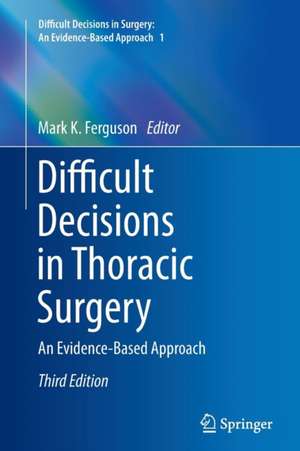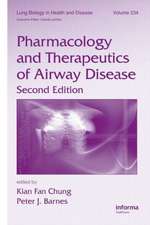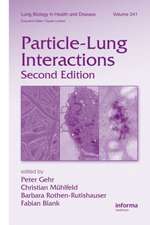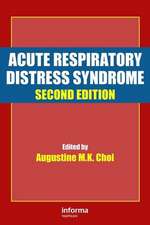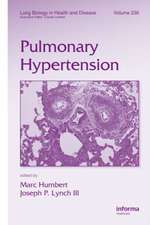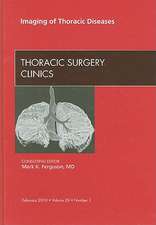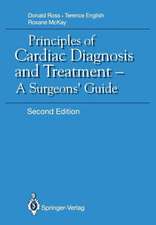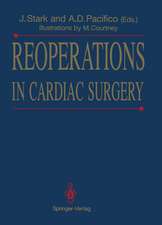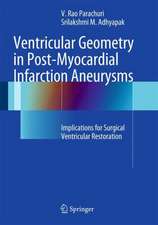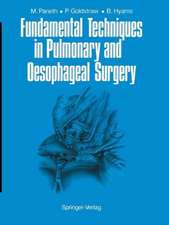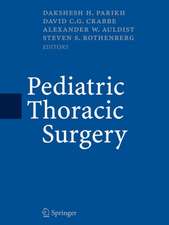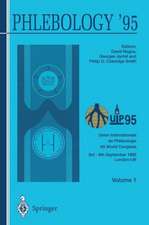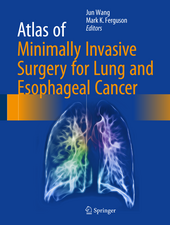Difficult Decisions in Thoracic Surgery: An Evidence-Based Approach: Difficult Decisions in Surgery: An Evidence-Based Approach, cartea 1
Editat de Mark K. Fergusonen Limba Engleză Paperback – 23 aug 2016
| Toate formatele și edițiile | Preț | Express |
|---|---|---|
| Paperback (2) | 796.50 lei 38-44 zile | |
| Springer International Publishing – 3 iul 2021 | 796.50 lei 38-44 zile | |
| SPRINGER LONDON – 23 aug 2016 | 1185.51 lei 6-8 săpt. | |
| Hardback (1) | 1070.28 lei 38-44 zile | |
| Springer International Publishing – 3 iul 2020 | 1070.28 lei 38-44 zile |
Preț: 1185.51 lei
Preț vechi: 1247.90 lei
-5% Nou
Puncte Express: 1778
Preț estimativ în valută:
226.87€ • 235.42$ • 189.63£
226.87€ • 235.42$ • 189.63£
Carte tipărită la comandă
Livrare economică 15-29 martie
Preluare comenzi: 021 569.72.76
Specificații
ISBN-13: 9781447171249
ISBN-10: 1447171241
Pagini: 812
Ilustrații: XXI, 787 p. 18 illus., 10 illus. in color.
Dimensiuni: 155 x 235 x 43 mm
Greutate: 1.12 kg
Ediția:Softcover reprint of the original 3rd ed. 2014
Editura: SPRINGER LONDON
Colecția Springer
Seria Difficult Decisions in Surgery: An Evidence-Based Approach
Locul publicării:London, United Kingdom
ISBN-10: 1447171241
Pagini: 812
Ilustrații: XXI, 787 p. 18 illus., 10 illus. in color.
Dimensiuni: 155 x 235 x 43 mm
Greutate: 1.12 kg
Ediția:Softcover reprint of the original 3rd ed. 2014
Editura: SPRINGER LONDON
Colecția Springer
Seria Difficult Decisions in Surgery: An Evidence-Based Approach
Locul publicării:London, United Kingdom
Cuprins
1. Introduction.- Part 1. Evaluations and Decisions.- 2. Evidence based medicine: quality of evidence and evaluation systems.- 3. Decision analytic techniques and other decision processes.- 4. Decision making: the surgeon's perspective.- 5. Decision making: the patient's perspective.- Part 2. Lung.- 6. Indications for pretreatment pathologic mediastinal staging in Non-small Cell Lung Cancer (NSCLC).- 7. Preoperative Smoking Cessation for Lung Resection Patients.- 8. High tech exercise testing in assessing candidates for lung resection.- 9. Management of perioperative anticoagulation during lung resection.- 10. Perioperative arrhythmia prophylaxis for major lung resection.- 11. VATS vs open lobectomy for stage I or II NSCLC.- 12. Robotic-assisted thoracoscopic surgery (RATS) versus video-assisted thoracoscopic surgery (VATS) lobectomy for Stage I or II non-small cell lung cancer (NSCLC).- 13. Lobectomy after induction therapy for non-small cell lung cancer in the presence of persistent N2 disease.- 14. Pneumonectomy after induction therapy for non-small cell lung cancer .- 15. Resection vs SBRT for stage I NSCLC in patients with good pulmonary function.- 16. Digital drainage systems after major lung resection.- 17. Management of Persistent Post-operative Alveolar Air Leak.- 18. Surveillance after resection of stage I non small cell lung cancer.- 19. Support therapy for lung failure: The utility of device therapy.- 20. Extracorporeal support for lung grafts prior to transplantation.- 21. Pulmonary Metastasectomy.- Part 3. Esophagus.- 22. Optimal therapy for Barrett High Grade Dysplasia.- 23. Preoperative chemo versus chemoradiotherapy for regionally advanced esophageal adenocarcinoma.- 24. The role of surgery in the management of regionally advanced esophageal squamous cell cancer.- 25. Optimal surgical approach to esophagectomy for distal esophageal adenocarcinoma.- 26. Regional extent of lymphadenectomy for esophageal cancer.- 27. Optimal number of lymphnodes to resect for esophageal cancer.- 28. Salvage esophagectomy for persistent disease after definitive chemoradiotherapy.- 29. Gastric emptying procedure after esophagectomy.- 30. Postoperative adjuvant therapy after resection of regionally advanced esophageal cancer.- 31. Prophylactic antireflux surgery in lung transplantation.- 32. Surgical versus Endoscopic Management for esophageal perforations.- 33. Stent for esophageal anastomotic leak.- 34. Management of small esophageal GIST tumors.- 35. Surgery for minimally symptomatic pulsion diverticula of the thoracic esophagus.- 36. Partial versus total fundoplication for GERD in patients with normal esophageal motility.- Part 4. Diaphragm.- 37. Diaphragm pacing for paralysis.- 38. Minimally invasive versus open repair of giant paraesophageal hernia.- 39. Synthetic reinforcement of diaphragm closure for large hiatal hernia repair.- 40. Diaphragmatic plication for eventration.- 41. Management of recurrent minimally symptomatic paraesophageal hernia.- Part 5. Airway.- 42. Stenting for benign airway obstruction.- 43. Bioengineered tissues for tracheal reconstruction.- 44. Percutaneous versus standard tracheostomy in the critically ill adult.- 45. Carinal resection for Non Small Cell Lung Cancer.- Part 6. Pleura and Pleural Spaces.- 46. Management of Persistent Postoperative Air Leaks.- 47. Fibrinolytics for managing pleural empyema.- 48. VATS versus open management of pleural empyema.- 49. Optimal management of symptomatic malignant pleural effusion.- 50. Pleurectomy versus radical pleuropneumonectomy for malignant pleural mesothelioma.- 51. Surgery and medical therapy for malignant pleural mesothelioma.- Part 7. Mediastinum.- 52. Extended versus standard thymectomy for myasthenia gravis.- 53. Optimal approach for resection of encapsulated thymoma: open versus VATS.- 54. Robotic versus VATS thymectomy for encapsulated thymoma.- 55. Video mediastinoscopy versus standard mediastinoscopy.- 56. Debulking for extensivethymoma.- 57. Surgery for palmar hyperhidrosis: patient selection and extent of surgery.- Part 8. Chest Wall.- 58. Synthetic versus biologic reconstruction of bony chest wall defects.- 59. Management of flail chest.- 60. Management of pectus deformities in adults.
Recenzii
From the book reviews:
“This is the third edition of a book on difficult and controversial topics in general thoracic surgery that presents practical and evidence-based advice. … It is written for practitioners and trainees in the area of general thoracic surgery. The editor is a recognized authority and has assembled an impressive list of authors to contribute on a comprehensive list of topics.” (Michael Bates, Doody’s Book Reviews, October, 2014)
“This is the third edition of a book on difficult and controversial topics in general thoracic surgery that presents practical and evidence-based advice. … It is written for practitioners and trainees in the area of general thoracic surgery. The editor is a recognized authority and has assembled an impressive list of authors to contribute on a comprehensive list of topics.” (Michael Bates, Doody’s Book Reviews, October, 2014)
Notă biografică
Mark K. Ferguson, MD is Professor of Surgery at University of Chicago Medical Center. He specializes in the surgical management of diseases of the lungs and esophagus. He is experienced in all techniques of lung and esophageal resection and is skilled in surgical methods to relieve airway obstruction and malignant pleural effusions. He has served on the boards and committees of numerous national societies and institutions including the Food and Drug Administration (FDA) and the National Institutes of Health. Dr. Ferguson is the author of more than 75 chapters in medical textbooks. He has edited or written books on esophageal reconstructive surgery, failed anti-reflux therapy, and decision-making in thoracic surgery. He recently authored an atlas of general thoracic surgery. Dr. Ferguson has also written more than 175 papers in medical journals, and serves as an editor or associate editor for three cardiothoracic surgery journals. His research interests include risk analysis and long-term outcomes after lung resection and esophageal resection.
Textul de pe ultima copertă
The third edition of Difficult Decisions in Thoracic Surgery: An Evidence-Based Approach, devotes itself to looking at questions and decisions in general thoracic surgery that are difficult or controversial. Focused topics are explored, and readers will find pithy analyses and recommendations which are carefully given in accordance with the level of supporting evidence available.
Written by recognized experts in the field, Difficult Decisions in Thoracic Surgery: An Evidence-Based Approach 3rd edition is a timely reference source for practicing surgeons, surgeons in training, and educators that describes the recommended ideal approach, rather than customary care, in selected clinical situations.
Written by recognized experts in the field, Difficult Decisions in Thoracic Surgery: An Evidence-Based Approach 3rd edition is a timely reference source for practicing surgeons, surgeons in training, and educators that describes the recommended ideal approach, rather than customary care, in selected clinical situations.
Caracteristici
The use of standard format for posing questions in each chapter permits the reader to rapidly identify the issue at hand A PICO formatting was used, to help the reader to easily identify useful clinical guidelines
